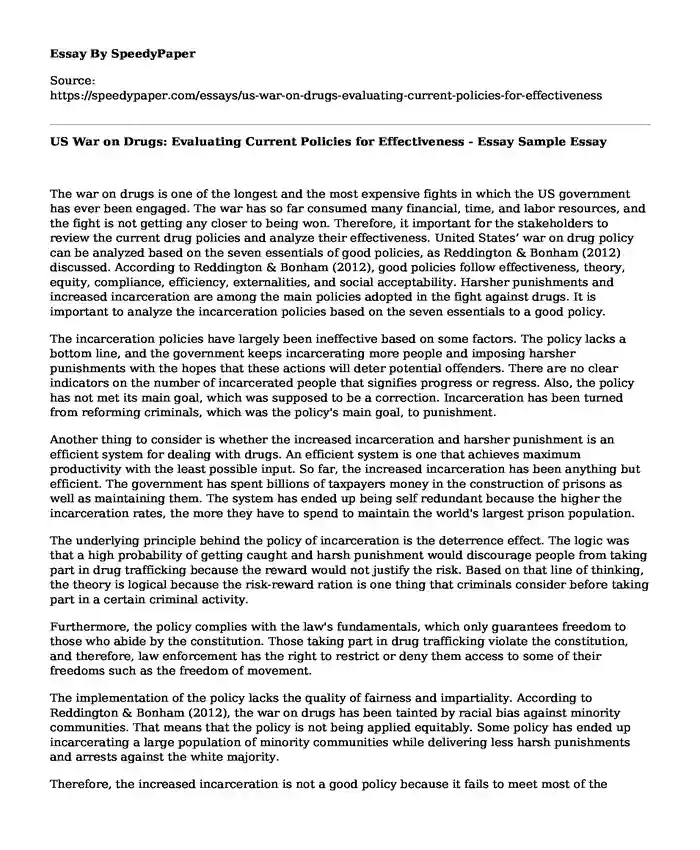
| Type of paper: | Essay |
| Categories: | Policy United States Drug abuse |
| Pages: | 3 |
| Wordcount: | 604 words |
The war on drugs is one of the longest and the most expensive fights in which the US government has ever been engaged. The war has so far consumed many financial, time, and labor resources, and the fight is not getting any closer to being won. Therefore, it important for the stakeholders to review the current drug policies and analyze their effectiveness. United States’ war on drug policy can be analyzed based on the seven essentials of good policies, as Reddington & Bonham (2012) discussed. According to Reddington & Bonham (2012), good policies follow effectiveness, theory, equity, compliance, efficiency, externalities, and social acceptability. Harsher punishments and increased incarceration are among the main policies adopted in the fight against drugs. It is important to analyze the incarceration policies based on the seven essentials to a good policy.
The incarceration policies have largely been ineffective based on some factors. The policy lacks a bottom line, and the government keeps incarcerating more people and imposing harsher punishments with the hopes that these actions will deter potential offenders. There are no clear indicators on the number of incarcerated people that signifies progress or regress. Also, the policy has not met its main goal, which was supposed to be a correction. Incarceration has been turned from reforming criminals, which was the policy's main goal, to punishment.
Another thing to consider is whether the increased incarceration and harsher punishment is an efficient system for dealing with drugs. An efficient system is one that achieves maximum productivity with the least possible input. So far, the increased incarceration has been anything but efficient. The government has spent billions of taxpayers money in the construction of prisons as well as maintaining them. The system has ended up being self redundant because the higher the incarceration rates, the more they have to spend to maintain the world's largest prison population.
The underlying principle behind the policy of incarceration is the deterrence effect. The logic was that a high probability of getting caught and harsh punishment would discourage people from taking part in drug trafficking because the reward would not justify the risk. Based on that line of thinking, the theory is logical because the risk-reward ration is one thing that criminals consider before taking part in a certain criminal activity.
Furthermore, the policy complies with the law's fundamentals, which only guarantees freedom to those who abide by the constitution. Those taking part in drug trafficking violate the constitution, and therefore, law enforcement has the right to restrict or deny them access to some of their freedoms such as the freedom of movement.
The implementation of the policy lacks the quality of fairness and impartiality. According to Reddington & Bonham (2012), the war on drugs has been tainted by racial bias against minority communities. That means that the policy is not being applied equitably. Some policy has ended up incarcerating a large population of minority communities while delivering less harsh punishments and arrests against the white majority.
Therefore, the increased incarceration is not a good policy because it fails to meet most of the essentials to good policy. The policy has not worked to significantly reduce the number of criminals involved in the drug trade hence ineffective. It has proven to be an inefficient system because it leads to a large prison population that imposes a huge burden on American taxpayers. The policy's implementation is marred with issues of racism and harassment of minority communities, hence the lack of equity.
References
Reddington, F. P., & Bonham, G. (Eds.). (2012). Flawed criminal justice policies: At the intersection of the media, public fear, and legislative response. Carolina Academic Press.
Cite this page
US War on Drugs: Evaluating Current Policies for Effectiveness - Essay Sample. (2023, Nov 29). Retrieved from https://speedypaper.com/essays/us-war-on-drugs-evaluating-current-policies-for-effectiveness
Request Removal
If you are the original author of this essay and no longer wish to have it published on the SpeedyPaper website, please click below to request its removal:
- Free Essay on Theodore Roosevelt's Character Traits that Helped Him Become Successful
- Free Essay Sample on Environmental Racism
- Free Essay on How Hegemonic Masculinity Has Increased Violence Against Women in Bangladesh
- Review of Economic Report of President FY 2017, Free Essay Sample
- Essay Example on Decision-Making in Public Health Spending
- School Uniforms in Public Schools - Essay Example
- Paper Sample on Evolution of Healthcare: Roles of Medical Professionals and Healthcare Policies
Popular categories




